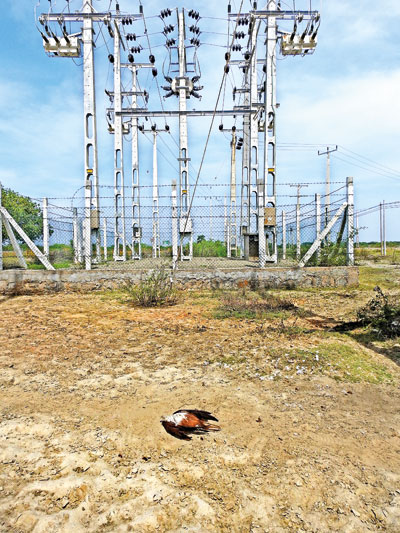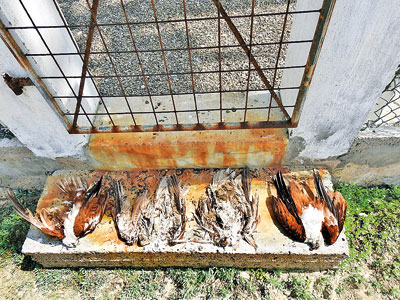News
Electrocutions killing large predatory birds
View(s):By Kasun Warakapitiya
Commonly called, raptors, these birds, including eagles, hawks, and large owl species such as the Eagle owl and Fish owls, are killed or maimed for life from electrocution by power cables, while smaller owls and kites are stuck down by speeding vehicles, mostly on expressways.

When birds of prey fall prey: A large number of bigger raptors were killed in Mannar as the Ceylon Electricity Board had erected power cables near the Vankalai Ramsar Wetland Sanctuary. Pix by Prof. Sampath Seneviratne
The Department of Wildlife Conservation, veterinary surgeon in charge of the western region and chief veterinarian at the Attidiya Rehabilitation Center, Dr Suhada Jayawardana said 300 to 500 large predatory birds are treated every year at the centre.
This is not the total number of large birds that are injured. There are eight other wildlife rehabilitation and veterinary centres in areas including Anuradhapura, Nikavertiya, Udawalawe, and Giritale.
“The biggest threat faced by large predatory birds is electric wires. Most of the birds that we receive have been electrocuted and most are maimed for life. They can’t be released,” he said.
“Some lose their wings and legs as a result of the injuries.’’ Burns cause tissue damage.
Eagles are among the victims of electrocution.
The endangered Legge’s Hawk Eagle and Rare Black Eagle, common Brahminey Kites, White-bellied Sea Eagle, Serpent Eagle, Forest Eagle Owl, Brown Fish Owl, are those that suffer electrocution from power cables.
Small species such as the Oriental Scops owl, Brown Scops owl and Barn owls, are struck down by vehicles on expressways. Land clearing, garbage dumps, and the use of pesticides pose additional dangers to birds in urban settings.
Professor in Zoology at the University of Colombo Sampath Seneviratne, who is also a researcher of birds, said the top predators are the cleaners in any ecosystem. They prey on weak and sick animals.
Large carnivorous birds, too, are responsible for controlling the numbers of herbivores and help maintain the balance of the ecosystem. If the numbers of predatory birds dwindle, an overpopulation of prey animals could destroy the ecosystem. “Most of these large, endangered, and rare predatory bird numbers are naturally low. So, if a few birds are killed, it could have a huge impact to the ecosystem. Authorities should take measures to protect them,” Prof Seneviratne said.
People hand over birds such as injured herons, pelicans and other birds to the national zoo.
The director of animal health and nutrition at the zoo, Dr Rajapaksalage Chandana Rajapaksa said most birds that are handed in have broken wings and leg fractures. These birds had been injured when trees are being felled, or have been stuck down by vehicles.
The use of pesticides in agriculture, and dumping of waste are also detrimental to birds as carnivorous birds feed on mice which feed on rubbish, or discarded spoiled meat.
The director general of the Department of Wildlife Conservation (DWC) Chandana Sooriyabandara said that he would study the data on injuries to birds.

| Projects must mitigate dangers to wildlife Authorities should consider protecting the wildlife and the ecosystem when undertaking development projects, professor in zoology at the University of Colombo, Sampath Seneviratne said. When the environmental balance is disrupted, pests could proliferate. “A large number of bigger raptors were killed in Mannar as the Ceylon Electricity Board had erected power cables near the Vankalai Ramsar Wetland Sanctuary,” he said. Authorities should assess the environmental impact and devise ways to reduce the damage to wildlife and environment. Prof Seneviratne also called on the people, authorities, and politicians to stop the felling of large trees which large birds need as roosting sites. | |
The best way to say that you found the home of your dreams is by finding it on Hitad.lk. We have listings for apartments for sale or rent in Sri Lanka, no matter what locale you're looking for! Whether you live in Colombo, Galle, Kandy, Matara, Jaffna and more - we've got them all!

